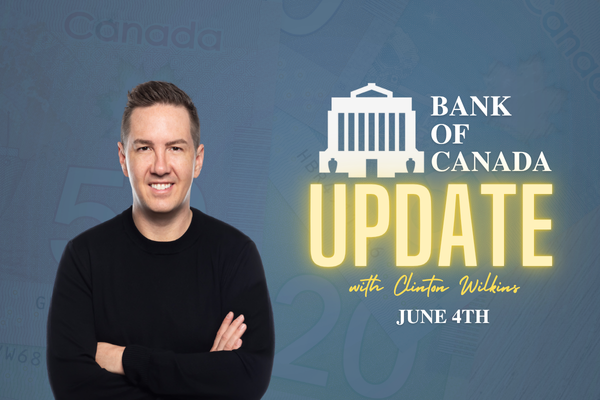Clinton Wilkins joins Todd Veinotte on 95.7 News Radio to discuss The Bank of Canada holding its key policy rate at 2.75%, marking the first pause after seven consecutive cuts.
CMHC Announcement – easing mortgage insurance policies – July 6, 2021 as heard on News 95.7
Clinton chats with News 95.7 host, Todd Veinotte, about the Canada Mortgage and Housing Corporation (CMHC) announcement. CMHC is easing their mortgage insurance policies after tightening them because of economic uncertainty due to the pandemic.
CMHC Announcement – July 6, 2021 as heard on News 95.7
Don’t feel like watching the video? Check out the transcript below.
Transcript:
What is CMHC?
Todd Veinotte: [00:00:01.05] The CMHC is easing its mortgage insurance rules and admits that it made a mistake. Joining me to talk about all of this is Clinton Wilkins, who is our mortgage guru, of course, mortgage broker. Clinton, thanks for doing this today. Appreciate your time. Policies
Clinton Wilkins: [00:00:17.85] Thanks for having me, Todd.
Todd Veinotte: [00:00:18.87] You got it. So for those who don’t know what CMHC is, give everybody a quick overview, first, please.
Clinton Wilkins: [00:00:25.20] It’s the Canadian Mortgage and Housing Corporation and it’s a Crown Corp. There are three mortgage insurers in Canada. CMHC is the government body, and then there’s two private corporations as well. And they all essentially do the same thing.
They provide different programs, but primarily the main focus is default insurance, which is required for banks to get on a borrower’s behalf any time that they buy a home and they put down less than 20 per cent.
And during the pandemic, CMHC changed their policies to make it more challenging for borrowers to qualify with them. But the other two insurers didn’t follow suit. So essentially, CMHC made a conscious decision to make it more challenging for applicants that would require their type of insurance or their insurance per se.
And basically, they said that they were wrong and they’ve reverted now back to their pre-pandemic underwriting policies.
Original change disadvantaged those in rural Canada
Todd Veinotte: [00:01:29.88] All right, so what’s changed to what they except for credit score, debt ratio, what are the changes?
Clinton Wilkins: [00:01:36.24] It’s actually both. So they’ve actually reduced their minimum beacon score requirement back to 600. And during this last change, they’ve actually increased it to 680 and now they’re allowing extended ratios as well. So that means that qualifiers that, you know, borrowers that have better credit scores can have extended ratios.
And during the last year or so, anyone that maybe had credit that wasn’t as great but still could qualify for high ratio mortgage insurance or maybe, you know, with more in debt at or was borrowing to, you know, there really to their max. They were only able to get insurance from the two private corporations.
The challenge is and this is what’s really important for our listeners here and really residents of Nova Scotia and across Atlantic Canada, CMHC insures, the most rural properties. So essentially these changes had disadvantaged those who are looking to buy a home in more rural areas of Canada.
So I think it’s great news for Canadians. I think that, you know, CMHC saying that, you know, they were wrong is, you know, a big pill for them to swallow. But I’m glad that now there is parity and alignment with all three insurers. It really balances the playing field for consumers.
CMHC lost market share
Todd Veinotte: [00:02:55.89] They lost some market share, from what I understand to the other insurers, I’m sure that was part of the motivation?
Clinton Wilkins: [00:03:03.93] Yeah. And I think they were looking to reduce the market share. At one time, CMHC had about 90 per cent market share. So basically the government was the primary backer of these high ratio mortgages. And, you know, that’s obviously changed over time.
They’ve removed some programs that the other two insurers still run, which is great. I mean, you know, I think competition is really, really important. But, you know, the federal government really is in business for homeownership. And I think it’s just so, so important. You know, this is what we talk about, Todd, during our show.
You know, it’s really about these dreams of homeownership. And when they made these changes, they were basically unfairly disadvantaging those who potentially could get insurance with them. And also basically, you know, it prevented some people in rural Canada from getting approved.
Will more mortgage insurers enter the market?
Todd Veinotte: [00:03:59.02] Do you anticipate at some point other entrance to the to this sphere, because I think you mentioned there’s two others beside CMHC or how many are there? And do you see that growing?
Clinton Wilkins: [00:04:11.92] There’s three insurers. So there’s the Canadian Housing Corporation, which is the Crown Corp, and then there’s Sagen and Canada Guarantee which are both private corporations. I don’t know if there’s going to be other players in the marketplace.
At the end of the day, they’re still all governed by the federal government, by the Department of Finance. So, you know, are there going to be other players that come into the Canadian market? It’s hard to say.
You know, our market in Canada is small compared to obviously the market in the US. You know, at one time there was some ownership like American ownership in these insurers, but now they’re essentially Canadian. And, you know, will there be other insurers that come into Canada? I’m not sure.
You know, the market’s only so big, but I do believe that having three insurers is important because maybe there’s a file that will work with the Canadian Mortgage and Housing Corporation that wouldn’t work with Sagen or Canada Guarantee or maybe there’s a file that will work with Sagen, but not Canada Guarantee. I think having that variety and also options, is just so, so important.
We never want to be in a business where there’s a monopoly. And, you know, I’m glad to see that the federal government is coming back in line with the other two insurers.
CMHC said their market shares are down – is this a concern to taxpayers?
Todd Veinotte: [00:05:31.51] But this is a Crown Corporation. Are there any concerns ultimately to taxpayers when it comes to exposure with CMHC and risk? Any thoughts on that or any comment?
Clinton Wilkins: [00:05:44.65] Well, CMHC financially actually does very, very well. You know, their primary, you know, goal is not necessarily a default insurance. They run a bunch of different programs from indigenous housing to low income housing to a bunch of different programs that they actually run, including like green home and eco housing.
So, you know, the CMHC is actually done transfer credits back to the federal government because they are so profitable. And, you know, I think their risk tolerance, obviously, over the last couple of years has been lower. But I think the federal government may be in a position where they can take more risk than the private insurers.
You know, it is the government they have, they print the money. So I don’t know. I don’t have the clear answer in terms of, you know, the risk. I think overall there were concerns around the market being inflated and that’s why they’ve changed some of the underwriting policies. But, you know, just thinking back, even a short few weeks ago, they changed the qualifying rate to make it more challenging for all borrowers to qualify. They’re always tweaking the policies.
“The pendulum swings”
And I’ve been doing this for 15 years and we’ve done almost a billion dollars worth of mortgage financing here in Halifax. And the pendulum swings from one, and to the other. And I think we’re now coming maybe more back in a neutral kind of environment. I remember when borrowers, you know, if they had a heartbeat, we were able to get them a mortgage.
Clinton Wilkins: [00:07:16.81] And I would say even today, it’s some of the most rigorous that I’ve seen in 15 years. But borrowers are still getting approved every day. It’s miraculous.
You know, I remember them when there was 100 per cent financing. And when that went away, you know, we thought, okay, now the market’s going to be dead. No first-time home buyers are going be able to qualify. But guess what? They figure it out and more and more, yes, from family are being involved.
And we’re seeing large gifts from family. You know, I think in some cases, mother, father, brother, sister, are even mortgaging their own homes to provide gifts to first-time home buyers to get into the market. And, you know, we get questions every day Todd about pricing because obviously the market is hot. There’s certainly a lot of transactions going on. But I think it’s kind of the new normal.
I think our real estate in Halifax at least, was undervalued for some time. And now I think we’ve come more in line with a city of this size. And, you know, I think there’s still a lot of opportunities for homeowners to purchase in Nova Scotia. You might not be buying on the peninsula, but maybe you can buy, you know, outside of the city or outside of HRM. There are still options for, you know, home buyers to become, get into the market.
Don’t miss Mortgage 101: Your Guide to Homeownership
Todd Veinotte: [00:08:31.24] And this is something that you and I can chat about on a Mortgage 101, which is you mentioned, tee up the show, I guess is what I’m suggesting you do.
Clinton Wilkins: [00:08:41.86] We’re going to be on this weekend. And we’re going to be talking, obviously it’s the summer so we’re going to talk about cottages. And, you know, there’s a lot of conversation around refinances right now, which I know when we’re talking about purchasing and the market being hot, you don’t really talk about refinance.
We’re getting a lot of questions around refinancing. Is it a good time, specifically about the mortgage rates, but also refinances are just so tied to the property values and where the values are up, it’s really creating some opportunities for existing home owners. I think it’s going to be a really good show.
We’re going to be on Saturday and Sunday here on News 95.7. So we’d love for you to tune in. And if there’s anything you want us to talk about during the show, feel free to, you know, send me an email or Todd an email or send us a tweet. And we’d love to chat about whatever you are curious about on our show.
Todd Veinotte: [00:09:35.78] Absolutely. 11 a.m. to 12 p.m. on Saturday and noon until 1 p.m. on Sunday. Clinton, I look forward to chatting later in the week, recording the show with you, and we’ll have some cool tunes as well. Thanks so much, Clinton.
If you have any questions, get in touch with us at Clinton Wilkins Mortgage Team! You can call us at (902) 482-2770 or contact us here.


